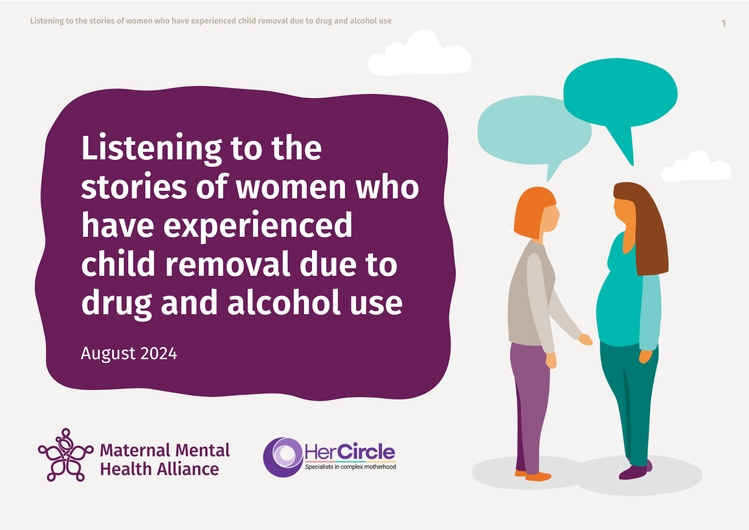Posted By: MMHA
28th August 2024
4 minute read

The Maternal Mental Health Alliance (MMHA) is pleased to announce the launch of a new report in collaboration with Her Circle (formerly 'REFORM'): ‘Listening to the stories of women who have experienced child removal due to drug and alcohol use’.
Read the reportIn December 2022, the MMHA began talking about a new piece of work that highlighted the voices of women often deeply stigmatised or underrepresented in the perinatal sector. We spoke about ‘deep listening’, led by people telling their stories, and the need to raise marginalised voices. It was then that the 'Listening Project' was born.
The first Listening Project Report shares the stories of three women with experience of drug addiction during pregnancy and the early days of motherhood. The report aims to shine a light on their experiences and centre their views on what is needed to improve the journey for others walking a similar path.
None of this work would have been possible without the three incredible women that we spoke with, and Her Circle, the organisation who facilitated our relationships with them from the early stages. We are hugely grateful for their time, experience and openness.
We first approached Her Circle in mid-2023 with a loose ‘pitch’ explaining what we wanted to do and why we wanted to do it. It was important to us that nothing was finalised at this point, as we knew that a flexible and agile approach would be essential in keeping the project as authentic and lived experience led as possible. We are grateful that Her Circle saw the potential in the project and were generous in sharing some of the protocols they’d put in place around their own ‘Still a Mam’ project.
One of the most important considerations for us was ensuring that the women who we listened to, felt safe to share their stories. When working with experts by experience, it’s vital that they have agency and capacity to guide the process and we were clear that we wanted to facilitate that as much as possible.
The focus was always on the substance use, never my mental health. But I used drugs because my mental health was the way it was.
In discussion with the women, we developed a series of questions and prompts to guide the conversations. When everyone was happy with this, the listening work took place through a series of 1:1 conversations through December 2023. Support was in place from the team at Her Circle, who already had strong relationships with the participants.
Our hope for the project was that through allowing these women space to share their thoughts and experiences, a narrative would begin to emerge and key indicators of what policy and practice changes are needed.
Early in the project, we were able to identify clear themes:
Alongside these themes was an acknowledgement that there is a significant lack of research within this area, and that investment here will provide a solid foundation for future recommendations.
Read the reportTo get your child removed, for me, still feels like a whole different level of failure. So, to speak with other people who have been through that… it matters so much.
Some actions have been taken to recognise the gaps within care, for example NHS England supported a good practice guide on trauma-informed care in the perinatal period and a small number of Maternal Mental Health Services now support women experiencing loss through care proceedings. However, many of the themes which came up in our conversations link directly to recommendations the MMHA has made from other pieces of research. This includes education and training for healthcare professionals, a need for a trauma-informed approach and a linked-up system across voluntary and statutory services.
Conversations around the need to make changes within the sector to support women experiencing addiction and other adversities are important, but for meaningful change to take place we must ensure that these women’s voices remain central to the conversations. We hope that the final report highlights the strength, persistence, empathy and courage shown by the women we spoke with and the absolute need to continue to include them in any future research.
Download the reportNone of this work would have been possible without the incredible support and enthusiasm for the project from Her Circle and, most importantly, the three women that we spoke with. To listen to their stories and be able to provide a platform for their voices to be heard is an immense privilege. We offer our gratitude, and our commitment to sharing the final report as widely as possible so that their voices continue to rise.
Her Circle is an organisation which supports women who have, or are at risk of, experiencing child removal. Her Circle seeks to break down stigma and affect change on a local, community and national policy level around this issue. Her Circle operates over three distinct areas:
Her Circle’s vision is to help reduce the number of children being removed from their families in a safe and supportive manor. They endeavour to develop ways that user voices can be heard, views valued to actively influence and shape services, policies and practice that exist to support them.
Learn more about Her Circle